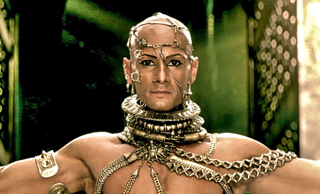A tidal wave of warriors' blood turns the sea a dark crimson red. War! Greeks against Persians. Only the courageous will survive to fight another day. Who will be the victors in this mythological tale of revenge and power?
Brazilian actor Rodrigo Santoro co-stars in "300: Rise of an Empire."
The classic 2006 film "300" set a high standard. Its art direction, cinematography, direction and special effects created a virtual, ancient world that was innovative and state-of-the art. Three hundred Spartan warriors, led by King Leonidas (Gerald Butler), went to their deaths in a narrow, inescapable Greek coastal passage named Thermopylae, rather than surrender to the evil, vastly outnumbering Persian army that was guided by the cruel mortal-turned God-King Xerxes (Rodrigo Santoro). That film was a memorable ode to courage. Franchising that story when the heroes all died, seems almost impossible. Almost.
Frank Miller, author of the novel "300," devised an ingenious storyline that paralleled the plight of the Spartans. Same time. Same country. Same foes. This time many of the skirmishes are at sea. And there are different protagonists: An Athenian general named Themistokles (Sullivan Stapleton, "Gangster Squad") is desperate to unite Greece's city-states as the Persians continue to threaten their shores. Xerxes is still the combatant, but his extremely vengeful female warrior Artemisia (Eva Green, "Casino Royale") leads his forces now. Years before, she was abused by the Greeks. Presently, she's bent on annihilation.
The core of this anti-sequel's success is the script by co-producer/co-writer Zack Snyder and co-writer Kurt Johnstad, who developed their story from Miller's anticipated novel "Xerxes." Credit the three aforementioned for the compelling storyline and three-dimensional characters. All should take a bow, as this film has the intensity, depth and conviction of some of the better sword and sandal movies ("Gladiator"). It's fiction, but feels so earnest and historic. The superior, authentic-sounding dialogue never feels derivative: Themistokles to his advisories, "We choose to die on our feet rather than live on our knees." If other warrior films that opened this year had scripts this strong they wouldn't have been awful ("Hercules") or tepid ("Pompeii").
The feel of this film is different, edgier than its predecessor, and that has to be attributed to commercial director Noam Murro. The first film, in its simple staging, felt like it was concocted by Da Vinci, it was ancient all the way through. "300: Rise of an Empire" feels more modern, heavy metal, darker, gothic. Almost like the film "Underworld" was turned into a classic Greek allegory. The intense fight scenes are brutal, almost like those in a horror film: severed heads, martial arts-type moves, horses galloping mystically over ships. The sexuality is vivid, sadistic, erotic: a bedroom scene where Artemisia invites Themistokles into her lair is about as racy as Mickey Rourke and Kim Basinger's in "9 1/2 Weeks." The vengeance, betrayals and rancor are so bitter.
Given the script and the direction's tone, the cast creates very specific characters, who wear their feelings (anger, remorse, envy) on their sleeves and to their graves. Stapleton resembles Charlton Heston somewhat, only a bit scraggly around the edges. Stalwart, heroic, steadfast. As Themistokles, who has assembled warriors around him that believe in his vision or debate it, he doesn't make a wrong move and neither do the perfectly chiseled actors who play his army. (If you had a penny for every six-pack set of abs in this movie you could buy a Trojan horse.)
Lena Headley portrays Queen Gorgo, wife of the slain hero Leonidas with great dignity. Rodrigo Santoro ("Che") reprises his role as Xerxes and his blank stares into the lens with his gold metallic shimmering body are menacing. He'd steal the movie away from Stapleton if it weren't for Eva Green as the vindictive commander. Sometimes when actresses take combative, physical roles they don't seem comfortable or confident. Green is so damn believable you'd walk to the other side of the street if she were coming your way. Hell-bent. Demonic. Ruthless. Sadistic. Her Artemisia is electric.
Most of the special effects are impressive. But there is a gimmick that is way over-used throughout the movie. When a throat is slashed or a chest impaled, deep dark blood spurts out into the air, close enough to stain your 3D glasses. Used sparingly, this would be a jolting experience. Instead it becomes a trite device.
Simon Duggan's ("Underworld: Evolution") photography and Patrick Tatopoulos production design ("Underworld: Evolution") keep the battle scenes dark, ominous and gloomy. Wyatt Smith and David Brenner's editing is quite tight for a 102-minute movie, which rarely stops to take a breath. Junkie XL's musical score is eerie. Costumes by Alexandra Byrne ("Elizabeth: The Golden Age") are so regal they look like they were discovered in a tomb.
This "300" will probably appeal to a younger audience than its previous incarnation. Even as the final credits roll there is a stop-motion animation sequence that is fun to watch and very hip.
The gripping story, dialogue, characters, acting and the overall production quality magically pull you into an ancient Greek netherworld that is ultra violent, sexy, mythical. The tidal wave of warrior's blood was not in vain.
Visit NNPA Syndication Film Critic Dwight Brown at DwightBrownInk.com.
